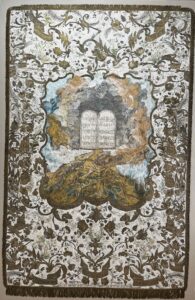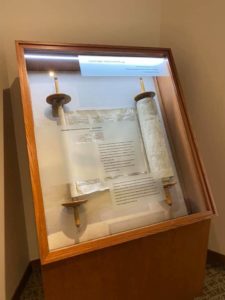On January 4, 1962, the Board of Directors of North Suburban Synagogue Beth El established the Kol Ami Collection. It was the dream of Maurice and Badona Spertus who donated many works that form the core of the collection. On March 8, 2002, the museum was dedicated by Ellen and Arnold Rissman as the Arnold Rissman Family Kol Ami Museum, in honor of their children, Lauren, Aron and Jacob, “with hope for the future.”
Today, the Rissman Kol Ami Collection includes the many art works and ritual objects displayed throughout the building and used by the congregation. Its mission is “to accept, collect and preserve objects of Jewish ceremonial art, articles of folklore, manuscripts and documents of historical value, in order to illustrate the biography and demography of the Jewish people from a spiritual and artistic point of view, reflecting the religious and cultural mode of life in the past and present.”
The diverse collection encompasses works from the 18th century to modern times that come from many countries around the world. The collection consists of paintings, sculptures, prints, rare books and Judaic ritual objects such as menorahs, spice boxes, crowns, rimonim (Torah finials), pointers, breast plates and a unique tik (Torah case).
The gallery area features objects from the collection as well as visiting exhibits throughout the year.
Visit the Rissman Kol Ami Collection exhibit space and see some of its treasures.
Current Exhibit
 Humans of October 7
Humans of October 7
June – August 2024
Israeli artist and photojournalist Erez Kaganovitz brings to light the human stories of the unique Israelis who stood up against terrorism in this powerful exhibit now on display in the synagogue entrance. The exhibit shows the Israeli DNA at its best and exemplifies the incredible spirit and resilience of the Israeli people. Sponsored by JCC Chicago’s Growing Hope initiative.
SAVE THE DATE: Thursday, July 18, 2:00 pm
Join us for a special reception in the museum gallery and a Zoom conversation with Erez Kaganovitz.
Click here to see our past exhibits.
Click here to view selected treasures from the Rissman Kol Ami Collection.
Click here for our Guidelines for Submitting an Art Exhibit Proposal.
Torah Ark Curtain (Parochet)

On August 20, 2023, Beth El dedicated the newly restored 18th century Italian Torah ark curtain, originally a gift to the collection by Badona and Maurice Spertus in 1962. This Torah ark curtain (parochet) is extraordinary because of its monumental size, masterful stitchery, and dynamic Baroque design. Encircled by a glory of clouds, the Tablets of the Ten Commandments burst forth to rest on Mount Sinai. Outlined in Rococo curves, the central medallion opens like a theater curtain to reveal the dramatic, visionary scene. Clouds surge over the top frame and heighten the explosive emergence of the Tablets. The silver thread of the gray clouds and bits of gold in the writing on the Tablets were likely plundered, perhaps by the Nazis. The lavish border of plants, flowers, and fruits reflects Italian botanical naturalism. Swirling vines and fanciful feathers in metallic bronze thread dance against the cream-colored silk background. Varied, intricate stitches form thick floral brocades, delicate leaves, and pastel flowers. Yellow pears grace the upper corners, red and black grapes nestle at the bottom. Along the bottom edge a Hebrew inscription dates the parochet and explains it was commissioned for an Italian synagogue in memory of Avraham ben Malach by his children: “In the year 1755 (5515 on the Hebrew calendar), a donation from the sons of the departed Avraham ben Malach. May he abide in Eden.”
The restoration of this parochet was generously funded by the Stephen Levin Family in loving memory of Diane Lynn Levin.
Czech Torah Scroll
 Beth El’s Czech Sefer Torah Scroll No. 44 is now beautifully displayed in a new case in the Choos Alcove. This Torah was once cherished by the Jews of Prostejov (“Prossnitz” in German), located in the Czech Republic. The Prostejov synagogue and yeshiva sustained a vital Jewish community until the Nazis invaded in March 1939. In July the synagogue was forced closed. This scroll, hand-written in the 1800s, was confiscated by the Nazis and warehoused with 1,563 Sifrei Torah from other devastated Jewish communities in a ruined synagogue in Michle, outside Prague. In 1964 the scroll was rescued from oblivion and traveled to the Westminster Synagogue in London as part of the Czech Memorial Scrolls Trust. It was brought from London to North Suburban Synagogue Beth El in 1980 by congregants Judith and Roger Leff.
Beth El’s Czech Sefer Torah Scroll No. 44 is now beautifully displayed in a new case in the Choos Alcove. This Torah was once cherished by the Jews of Prostejov (“Prossnitz” in German), located in the Czech Republic. The Prostejov synagogue and yeshiva sustained a vital Jewish community until the Nazis invaded in March 1939. In July the synagogue was forced closed. This scroll, hand-written in the 1800s, was confiscated by the Nazis and warehoused with 1,563 Sifrei Torah from other devastated Jewish communities in a ruined synagogue in Michle, outside Prague. In 1964 the scroll was rescued from oblivion and traveled to the Westminster Synagogue in London as part of the Czech Memorial Scrolls Trust. It was brought from London to North Suburban Synagogue Beth El in 1980 by congregants Judith and Roger Leff.
To Bear Silent Witness to our Past. To Honor the Memory of the Prostejov Community. To Remember the Shoah. The Torah is rolled to Deuteronomy 25:17-19:
Remember what Amalek did to you . . . do not forget. These cautionary words from Parsha Ki-Teze in Devarim recall the biblical nation of Amalek, which attacked the Israelites in the desert. We read these verses on Shabbat Zachor, the Shabbat before Purim, in connection with the megillah story of the oppressor Haman. The Nazis were also regarded as evil Amalekites. Abraham Lewin, a member of the clandestine Oneg Shabbat, a group that chronicled life in the Warsaw ghetto, wrote in his diary on June 6, 1942: We want our sufferings to be described for future generations. We meet every Shabbas to tell each other what the old-new Amalekites are doing to us, the Jews. These stories always weigh on me and my head starts to ache.